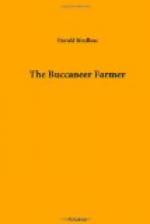Grace went on and Kit turned back to the farm with a satisfaction that made his heart beat. In a way, the girl had given him her confidence; she had, at least, not hidden her feelings. Her proud calm was only on the surface; it covered a generous, impulsive nature. Then she had pluck, because he could understand her difficulties. She was loyal to her father, but hated injustice and was quickly moved to sympathy. All the same, he had noted that when she spoke of Osborn renewing the lease she said we, and since he knew why she had done so, it gave him cause to think.
It was the code of the old school; the family stood together, a compact unit to which she belonged and for whose deeds she believed herself accountable. In a sense, this was rather fine; but Kit, knowing Osborn’s pride, saw it would confine their friendship to narrow limits. Still he had no ground for imagining she was his friend, and he tried to fix his thoughts upon the search for the sheep. Grace obviously meant to talk to Osborn, but Kit did not believe the latter would be moved by her arguments.
When Kit returned to the farm kitchen Railton was sitting moodily by the fire and his wife’s face was sternly set. They are not an emotional people in the dales, and her trouble was too deep for useless tears, but as she glanced about the room all she saw wakened poignant memories. The old china in the rack had been her mother’s; she had brought it and the black oak meal-chest to Mireside thirty years since. The copper kettles and jelly-pan were wedding presents, and Tom, her son, who died in Australia, had sent the money to buy the sewing machine. Now it looked as if her household treasures must be sold, and to leave Mireside would mean the tearing up of roots that had struck deep. Besides, while she would suffer it would hurt her husband worse. When Kit came in she gave him a keen glance.
“Weel, what had Miss Osborn to say?”
“She didn’t say much; I think she means to talk to Osborn.”
Railton looked up gloomily. “T’ lass has a good heart, but talking to Osborn will be o’ nea use. Hayes is real master and he wants Mireside for Jim Richardson.”
Kit made a sign of agreement. “The fellow’s getting dangerous and must be stopped. I suspect he’s backing Bell and now he means to use his nephew; it’s not altogether for Richardson’s sake he wants to break your lease. Some day I imagine Osborn will find his agent owns the estate; but that’s not our business. Well, Peter told me to remind you that you and he are old friends, and if a hundred pounds would be some help—”
“It would be a big help,” said Railton, and Kit turned to the shepherd when Mrs. Railton awkwardly began to thank him.
“About the broken dyke, Tom? What d’you think brought it down?”
“I canna tell. Dyke’s good and there was nea wind.”
They were all silent for a few moments, and then Kit said, “Well, Richardson is a cunning hound.” He paused and picked up his hat before he turned to Railton. “I’ve a job at Ashness that must be finished to-night. There’s not much time, but if it’s possible Tom and I will find the sheep.”




